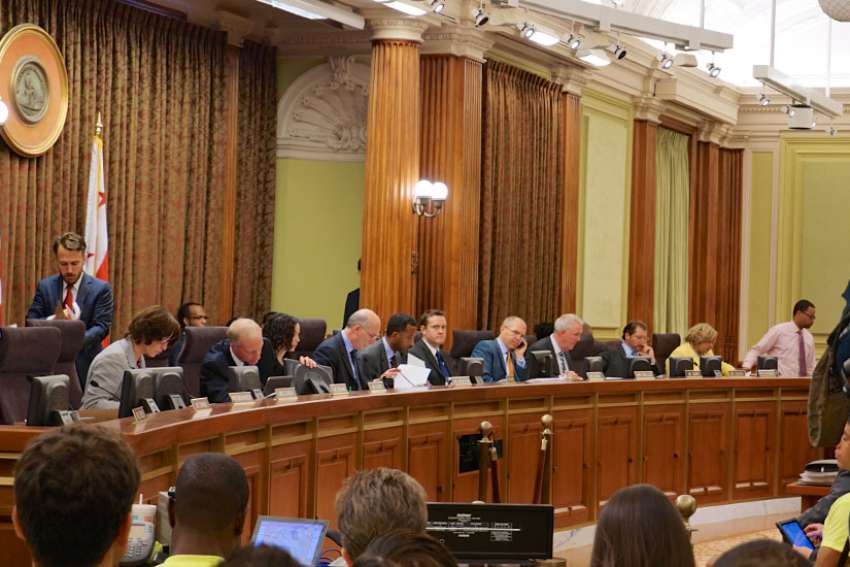On a voice vote, a majority of the 13-member council approved the "Death with Dignity Act" that permits physicians in the District of Columbia to legally prescribe the drugs to patients who have been deemed mentally competent and who have received a terminal diagnosis of six months or less.
The vote does not mean legalized assisted suicide is now the law in the district. The measure moves to Mayor Muriel Bowser for approval or veto. If it is approved, the law would be subject to congressional review.
Michael Scott, director of the D.C. Catholic Conference, blasted the council decision. "Once again council members who voted for the legislation failed to address serious public policy concerns raised by the broad and diverse coalition opposing the legislation," he said in a statement.
Ward 7 Councilmember Yvette M. Alexander, chairperson of the Health and Human Service Committee, and Ward 1 Councilmember Brianne Nadeau offered the only votes opposing the measure. There was no discussion of the legislation.
Prior to the vote, the council approved an amendment proposed by Alexander that requires the Department of Health to include data from all patients who submit written or oral requests for the lethal medication in an annual statistical report. Prior to the amendment, the legislation only required that the report include data from a sample of information sent by doctors.
Scott said Bowser can veto the bill in view of the concerns raised by opponents, "some of which," he said, "were also outlined by her Department of Health director, (Dr.) LaQuandra Nesbitt, during her public testimony last year. It would be irresponsible to ignore her own subject experts and the large number of residents who oppose the legislation."
Nesbitt, who was appointed by Bowser, has openly opposed the bill, saying it violates her Hippocratic oath.
In a statement prior to the final vote, Scott the new law is closer to "assisted homicide" than assisted suicide because it violates a section of the D.C. Code that classifies as a first-degree murderer "whoever, being of sound memory and discretion, kills another purposely, either of deliberate and premeditated malice or by means of poison."
The D.C. Catholic Conference represents the public policy interests of the Catholic Church in the District of Columbia. The conference, which joined a broad based coalition of other groups in opposing the measure, issued a statement expressing disappointment at the conclusion reached by the council.
"The D.C. Catholic Conference is sorely disappointed that the City Council passed the so-called Death with Dignity Act of 2015 legalizing assisted suicide in the District of Columbia," the statement said. "This bill imperils residents particularly those who are sick, elderly, disabled, and uninsured in our communities. It allows for coercion and abuse including third-parties administering the lethal drugs to patients who may or may not be incapacitated and or even requesting assisted suicide.
"Along with No DC Suicide, the conference will continue to press Mayor Muriel Bowser to veto this extreme, reckless, and dangerous legislation opposed by a large number of city residents," it said.
When the council approved a first reading of the measure Nov. 1, Scott said the law "discriminates against our African-American and Hispanic neighbors, sick seniors, the disabled, the uninsured and all who are vulnerable in our community."
Opponents say the bill is flawed because it endangers "high-risk" populations including the elderly, the uninsured and underinsured, the homeless, low-income individuals and those with intellectual disabilities.
They also point out it does not require doctors to give patients a screening for depression before providing them with the lethal prescription; the patient is not required to notify family members before taking the medication; and no doctor, nurse, or legal witness is required to be present when the lethal dose is taken.
Even those councilmembers who voted for the measure acknowledge that there may be dangers with the bill. They earlier approved an amendment to the original proposal that allows the city's medical examiners to investigate possible coercion and abuse in assisted suicide cases.
Introduced in 2015 by Ward 3 Councilmember Mary M. Cheh, a member of the Health and Human Services Committee, the law permits a physician to legally prescribe lethal drugs to patients who have been deemed mentally competent and who have received a terminal diagnosis of six months or less.
When she introduced the bill, Cheh said permitting the terminally ill to kill themselves provides "a humane and dignified manner" of dying. On Nov. 1, she said the measure "allows those people on death's doorstep to choose a compassionate death."
If the bill eventually becomes law, the District would be the nation's seventh jurisdiction to allow doctors to assist the terminally ill to kill themselves. Five states -- Vermont, Oregon, Washington state, Montana and New Mexico -- previously allowed assisted suicide. On Nov. 8, Colorado residents approved a proposition legalizing physician-assisted suicide there.
Similar physician-assisted suicide laws have been introduced and have failed in 22 states.
Oregon, Washington, and Colorado legalized assisted suicide through ballot initiatives. Scott noted that because the measure was not put to referendum for citizens to vote on, city residents have had "their opinions dismissed on a literally life and death issue. This strikes many as unfair and unjust."


